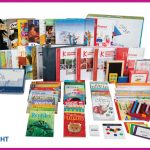After so many years of homeschooling, I often have the privilege of talking with folks who are just considering or researching the possibility of educating their children at home. One of the first choices they evaluate is which homeschool curriculum to use. They've either spent some time researching homeschool curriculum on the Internet or they've attended a homeschool convention ... and it's at that point that I end up talking with them ... the glazed "deer in the headlights" look still in their eyes. The choices out there seem endless.
I usually try to simplify the task just a bit by asking them to look at curriculum products based on teaching style. I'm sure there are more categories, but I usually break it down to five:
- Traditional - This style relies heavily on the textbook/workbook approach to education. Similar to the classroom experience many of us are familiar with from our own childhoods. Some publishers: Bob Jones, ABeka, Alpha & Omega.
- Unschooling - Essentially the opposite end of the spectrum from traditional homeschooling. This style recommends providing a variety of experiences and resources to stimulate a child's in-bred desire to learn. Delight driven learning is a common phrase heard among unschoolers. John Holt is a name often associated with the unschooling approach.
- Unit Studies - are topic driven units that intermesh history, literature, writing, science and other subjects around a common theme. These can be accomplished by purchasing pre-packaged units or designing your own by making liberal use of your library. Some publishers: KONOS, Amanda Bennett's Unit Studies.
- Classical - is a term synonymous with The Well Trained Mind by Susan Wise Bauer. The premise is that children move through different stages of learning, each requiring a slightly different approach. There is a heavy emphasis on the use of living books, study of logic and a chronologic look at history. Some publishers: Veritas Press, Peace Hill Press.
- Literature Based - falls somewhere between unit studies and a classical approach. Relying heavily on the writings of Dr. Ruth Beechick and Charlotte Mason, this teaching style relies on exposing children to great ideas found in classic literature with a goal toward developing a love for learning. Some publishers: Sonlight Curriculum, Tapestry of Grace.
While this isn't an exhaustive list, it does help to narrow down the choices a bit. There are a couple other resources which I think are very helpful in making choices about homeschooling (though I admit to being somewhat biased about these!):
- Podcast - You Can Homeschool
- Podcast - How to Do It: How to discover the homeschooling vision that best fits your family's needs
Hopefully this brief "Homeschooling 101" will give you somewhere concrete to begin as you consider homeschooling.
Best wishes on the journey ...
~Judy





